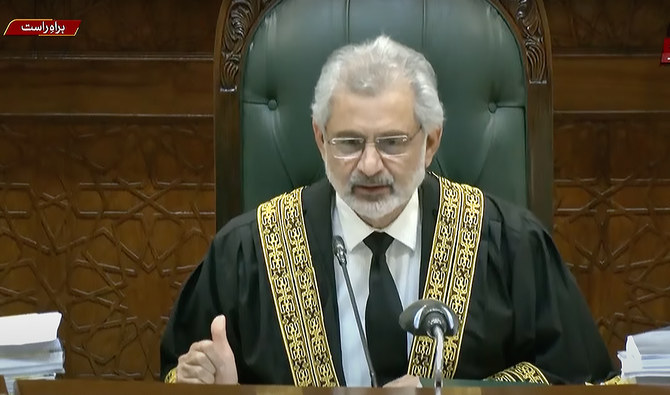By Imtiaz Hussain Abro.
Islamabad: A panel of seven Supreme Court judges is poised to conclusively decide whether the lifetime electoral disqualification mandated by Article 62(1)(f) of the constitution, as previously directed by the court, will take precedence, or if the Elections Act 2017, which subsequently reduced the ineligibility to five years, will prevail.
SC to settle disqualification question today: Led by Chief Justice of Pakistan (CJP) Qazi Faez Isa, the extended bench, comprising Justice Syed Mansoor Ali Shah, Justice Yahya Afridi, Justice Amin-ud-Din Khan, Justice Jamal Khan Mandokhel, Justice Muhammad Ali Mazhar, and Justice Musarrat Hilali, is scheduled to initiate the hearing on Tuesday.
On December 11, the court had delegated an electoral disqualification dispute to a three-judge committee established under the Supreme Court (Practice and Procedure) Act 2023. The committee was tasked with forming a larger bench to make a definitive decision on the matter.
The referral for final adjudication was prompted by a legal dilemma arising from the SC’s April 13, 2018, judgment in the Samiullah Balcoh case, which permanently barred politicians disqualified under Article 62(1)(f) from entering parliament. This unanimous verdict declared such ineligibility as a lifelong ban. However, on June 26, 2023, an amendment was introduced in the Elections Act 2017, through Section 232(2), stipulating that the period of electoral disqualification would be five years, not a lifetime.
The absence of a challenge to the amendment to the Election Act has the potential to create confusion in future elections, forcing a choice between adhering to the SC judgment or the Elections Act. Chief Justice Isa had expressed concerns during the previous hearing, emphasizing that such ambiguity is detrimental to democracy.
The controversy emerged during the hearing of an election dispute initiated by Sardar Confcius Imam Qaisarani against Sardar Mir Bashah Khan Qaisarani, where candidates seeking to contest elections faced disqualification issues. The matter involved both a provincial assembly seat and a National Assembly seat, with the same underlying issue.
The genesis of the issue traces back to the 2008 general elections, which required candidates to hold a minimum graduation qualification. Candidates made false declarations in their nomination papers, presented degrees from unrecognized institutions, and submitted fake degrees to meet eligibility criteria.
In a previous order, the Supreme Court disqualified such candidates, some of whom faced criminal prosecution. The court intervened only in matters related to disqualification, as a criminal appeal was pending before a high court. The disqualification issue arose when Sardar Mir Badshah Khan Qaisarani was disqualified for presenting a fake degree while filing nomination papers for NA-189 and PP-240 Taunsa constituencies in the 2008 and 2018 elections, respectively.
During the hearing, the SC bench emphasized that the pending case should not be used to delay the February 8, 2024, general elections. The court cautioned against airing apprehensions about election delays, stating that such actions could lead to contempt of court charges. Assistance was sought from the Attorney General for Pakistan, Mansoor Usman Awan, provincial advocate generals, and the Election Commission of Pakistan. The court also ordered the publication of a public notice in prominent English and Urdu newspapers, allowing interested parties to join the case.

